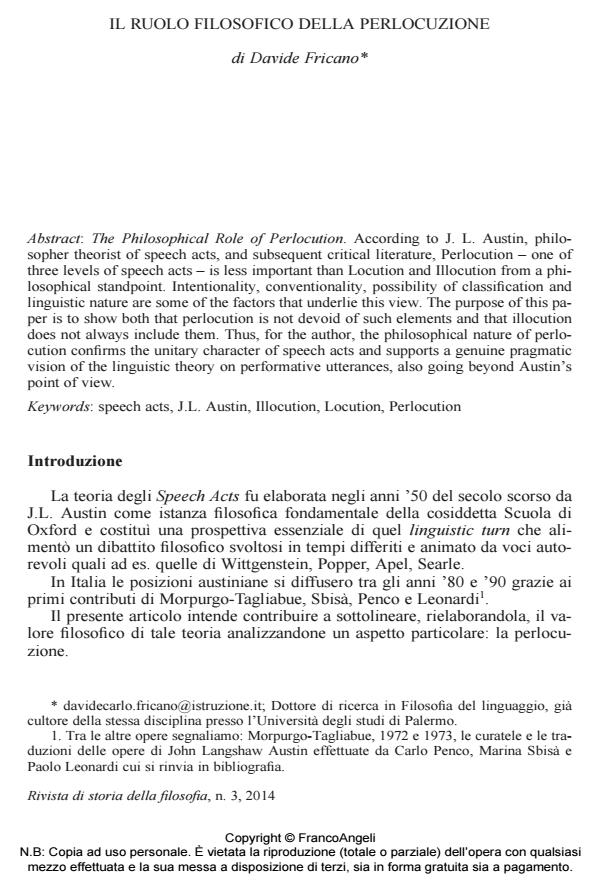The Philosophical Role of Perlocution.
Journal title RIVISTA DI STORIA DELLA FILOSOFIA
Author/s Davide Fricano
Publishing Year 2014 Issue 2014/3 Language Italian
Pages 27 P. 495-521 File size 89 KB
DOI 10.3280/SF2014-003005
DOI is like a bar code for intellectual property: to have more infomation
click here
Below, you can see the article first page
If you want to buy this article in PDF format, you can do it, following the instructions to buy download credits

FrancoAngeli is member of Publishers International Linking Association, Inc (PILA), a not-for-profit association which run the CrossRef service enabling links to and from online scholarly content.
According to J. L. Austin, philosopher theorist of speech acts, and subsequent critical literature, Perlocution - one of three levels of speech acts - is less important than Locution and Illocution from a philosophical standpoint. Intentionality, conventionality, possibility of classification and linguistic nature are some of the factors that underlie this view. The purpose of this paper is to show both that perlocution is not devoid of such elements and that illocution does not always include them. Thus, for the author, the philosophical nature of perlocution confirms the unitary character of speech acts and supports a genuine pragmatic vision of the linguistic theory on performative utterances, also going beyond Austin’s point of view.
Keywords: Speech acts, J.L. Austin, Illocution, Locution, Perlocution
- - Apel 1989: Karl Otto Apel, Il logos distintivo della lingua umana, Guida, Napoli 1989.
- - Austin 1987: John Langshaw Austin, Come fare cose con le parole, a cura di Carlo Penco e Marina Sbisà, Marietti, Genova 1987.
- - Austin 1990: Id., Saggi filosofici, a cura di Paolo Leonardi, Guerini, Milano 1990.
- - Bianchi 2003: Claudia Bianchi, Pragmatica del linguaggio, Laterza, Bari-Roma 2003.
- - Cohen 1988: Ted Cohen, Illocuzioni e perlocuzioni, in Marina Sbisà (a cura di), Atti linguistici, Feltrinelli, Milano 1988, pp. 126-142.
- - Davis 1980: Steven Davis, Perlocutions, in John Rogers Searle-Ferenc Kiefer-Manfred Bierwisch (edd. by), Speech Act Theory and Pragmatics, Reidel, Dordrecht-Boston-London 1980, pp. 37-55.
- - De Mauro 2000: Tullio De Mauro, Il dizionario della lingua italiana, Paravia, Milano, 2000.
- - Gaines 1979: Robert N.Gaines, Doyng by Sayng: Toward a Theory of Perlocution, «Quarterly Journal of Speech», 65 (1979), pp. 207-217.
- - Grice 1988: Herbert Paul Grice, Logica e conversazione, Il Mulino, Bologna, 1988.
- - Gu 1993: Yueguo Gu, The Impasse of Perlocution, «Journal of Pragmatics», 20 (1993), pp. 405-432.
- - Habermas 1985: Jurgen Habermas, Teoria dell’agire comunicativo, Il Mulino, Bologna 1985.
- - Morpurgo-Tagliabue 1972: Guido Morpurgo-Tagliabue, J.Austin, tra logica e linguistica; parte I in «Rivista critica di storia della filosofia», XXVII (1972) 4, pp. 409-434; parte II, XXVIII (1973), 1, pp. 55-81.
- - Pautler-Quilici 1999: David Pautler-Alex Quilici, A Computational Model of Social Perlocutions, Department of Electrical Engineering of University of Hawaii, Manoa, Honolulu,1999.
- - Sbisà 1988: Marina Sbisà (a cura di), Gli atti linguistici, Feltrinelli, Milano 1988.
- - Sbisà 1989: Id., Linguaggio, ragione, interazione. Per una teoria pragmatica degli atti linguistici, Il Mulino, Bologna 1989.
- - Sadock 1974: Jerrold Sadock, Toward a Linguistic Theory of Speech Acts, London Academic Press, New York 1974.
- - Searle 1992: John Rogers Searle, Atti linguistici, Bollati Boringhieri, Torino 1992.
- - Searle 1985: Id., Dell’intenzionalità, Bompiani, Milano 1985.
Davide Fricano, Il ruolo filosofico della perlocuzione in "RIVISTA DI STORIA DELLA FILOSOFIA" 3/2014, pp 495-521, DOI: 10.3280/SF2014-003005